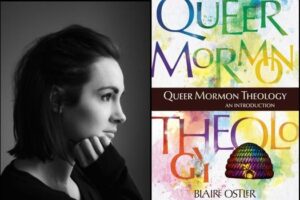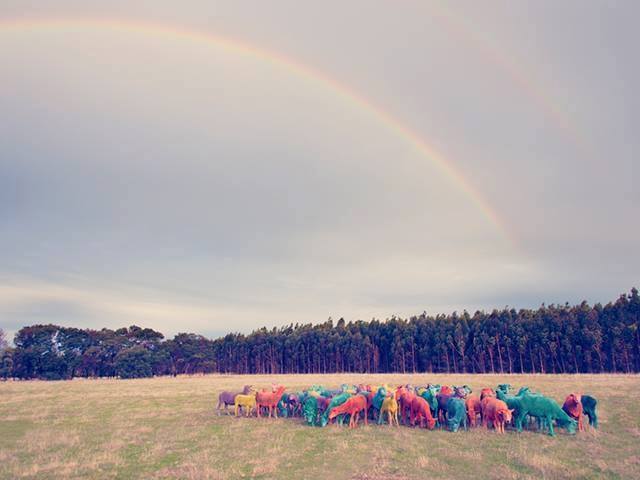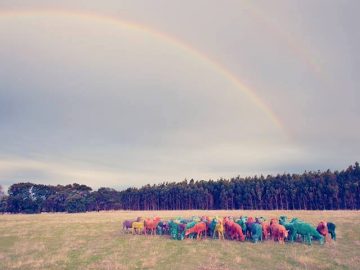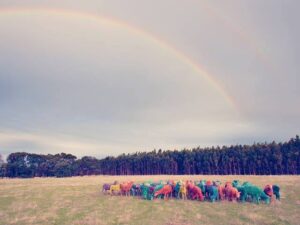A few years ago, I was talking with a friend about some of the strange and unique aspects of Mormon life and belief. He shook his head at one point in the conversation and said, “Mormons are weird.” Then he seemed worried that I might be offended at what he said. But I smirked, and said, “Absolutely! If you look up the word weird in the dictionary, the first example is Mormonism. I choose to embrace the weirdness.”
I think I always have. As I learned of my Mormon heritage, reaching back generations, I relished learning of the struggles along with the strengths, and especially the thoughts and ideas that were unlike anything I heard from other families. I liked hearing about teachings and questions and revelations that spoke of a God who was expansive, co-existing with us, and a belief that was encompassing of all things good and inspiring, from any source. Often, it is the unique and weird aspects of Mormonism that keep me connected to the church, even when leaders or fellow members display rhetoric and actions that are painful, marginalizing or destructive. Those actions are common to any organization or community which involves humans, and I learned I would encounter those anywhere. I felt drawn to what seemed unusual about my religious tradition, even and especially with the usual human elements.
I liked being a part of a peculiar people.
I mourn when there is any attempt by members to “normalize” the restoration experience or message. The world is full of pressure or opportunity to conform, blend in, or encourage acceptance through sameness and agreement. I don’t find that inspiring or inviting toward God or godhood. We have an entire pre-existence story that explains why. There we all were, intelligences which had existed as long as the Gods. But They had found ways to seek wisdom and grow in knowledge, creating new worlds as they sought to grow in complex experience and greater wisdom. They invited us to follow them, and become new beings, reborn in the journey toward divine existence. But there was opposition in this journey, pleasure along with pain, destruction along with creation. It could only work if those who stepped forward into the journey chose it with full understanding of the strange nature of it – the very opposition and complexity of the journey is what creates the process of godhood. If there were a predictable, guaranteed pattern for everyone to follow, where all was controlled so everyone would behave the right way and do the right things and be acceptable no matter what, there would be no inspiration, no progression, no practice that would transform us. Our story tells us that it was still difficult for us to choose freely. As we are all a part of each other, at least one third of our selves wondered if it might not be better to surrender any strange, peculiar, unpredictable, uncertain part of our journey. At least a third of our selves were drawn to safe, guaranteed sameness. Our pre-existence story tells us that God inspired and invited us to embrace an unpredictable, peculiar journey toward glorious wisdom and godhood.
I love how weird that is. And that is just one part of what I embrace in Mormon weirdness.

Now, with the release of Blaire Ostler’s new book, “Queer Mormon Theology – An Introduction”, I have an eloquent published reference that includes so many aspects of what I love about Mormon belief. I also have an additional descriptive word. And the word is queer.
If you don’t need any more justification than that, then please just go and get this book and read it. Mark it up, turn down the page corners, put tabs in it so you can refer to it for talks, or lessons, or discussions, or meditation, or prayer, or those moments when you wonder why it is that you keep resisting some kind of conformity in any community, and that resistance seems to be connected with something that is deep in you, a part of you that connects to a divine journey that is uniquely, weirdly, queerly yours. I ask you to consider that the resistance to conform for the sake of conformity, the inspiring pull to be uniquely you even in a journey that is shared in part with countless others, is very Mormon.
I appreciate the way a book about queer theology, written by a queer woman can be such a valuable gift and resource for everyone and anyone seeking value in Mormon teaching and experience. I am a cis-het woman, who seeks understanding of the experiences and perspectives of my queer siblings in my efforts to be an ally and advocate. This book shares Ostler’s insights from her perspectives as a queer Mormon, and yet I felt I was reading about my own thoughts, as well. The use of the word “queer” in this book can apply to more than those who identify as LGBTQ+. It also applies to the peculiar nature of Mormon theology, and embraces it as such. In this broader sense, to be Mormon is to be queer. I celebrate a book that informs us about this.
And I am grateful for any new book that references Joseph Smith’s King Follett Discourse early and often. I began learning of this rich speech over 50 years ago, when I was still in primary. It helped shape my questions and ideas about being from that time on.
Ostler has written a concise and interesting volume which organizes her main areas of theology into chapters concerning God, Christ, The Family, Sexuality and Creation, Polygamy, and Policy. And she begins it all with a chapter about theology itself, to clarify her approach. Within the chapters, there are sections that examine aspects of the chapter subject. In the God chapter, section titles such as “God is Singular and Plural”, “God is Intelligence”, “God is Love”, “God is Dynamic”, invite the reader to consider reference from restoration scripture and thought that explores the theology expressed, as well as how it is queer, and how it can be inspiring for all.
That is one of things I appreciate about this book. Ostler is presenting a clear perspective and interpretation, sharing it with a variety of resources, reference, reasoning and personal experience. She is not arguing, or trying to convince anyone to agree or disagree. I felt she was offering a way of seeing, and the possibility of embracing the queerness of Mormon Theology.
I could elaborate on the many details I appreciated seeing in print, but I think you will find more value in reading it and discovering what is inspiring for you.
I will include a quote from a section in the chapter Concerning Christ. This is one of the most concise expressions of how the queer experience is very much a part of what Christ reveals in the Atonement – as experienced in Gethsemane, and in every moment of one-ness with each of us since then.
“In Gethsemane, Jesus experienced the pains of a person dying of cancer. He experienced what it is like to be a queer kid who is constantly bullied. He experienced the birthing pains of every mother who ever lived or would live. He experienced the embarrassment of a gay boy having an erection at the sight of his school crush in the locker room. He experienced conversion therapy. He experienced rejection. He experienced the brutal physical and psychological attacks that trans women endure. He experienced the acid poured on a woman’s face for her defiance to the patriarchs. He experienced the fear, grief, and sorrow of every parent who has buried their child. He experienced sex slavery. He experienced his first period. He experienced menstruation, not simply from a vagina but from every pore of his body. He experienced rape. He experienced catcalls. He experienced hunger. He experienced disease. He experienced an ectopic pregnancy. He experienced an abortion. He experienced a miscarriage and stillbirth. He experienced the Holocaust. He experienced war – both the killing and being killed. He experienced internment camps. He experienced depression, anxiety, and suicide. He experienced sleeping on the street with the homeless. He experienced the slave master’s whip on his back and the noose around his neck. He knew the fear of every black mother who kissed her son before he left the house, praying he would return home safely. He experienced the effects of unrighteous dominion, corrupt politicians, and all manner of injustice. He experienced the migrant mother with no food or diapers for her baby as she desperately walked north in search of a better life. He experienced having his child taken away from him at the border due to “legal complications.” He experienced it all – every death, every cut, every tear, every pain, every sorrow, every bit of suffering imaginable and beyond imagination. He experienced an onslaught of suffering, which was so great that it took a god to bear it. He experienced death and came through the other side to show us the way.” – Queer Mormon Theology pp. 38-39, by Blaire Ostler.
This is a moving account of the theology of At-one-ment, a most peculiar way of seeing that this deeply mystical connection is not about a demand for justice, or payment of debt. It is about being one with each and every being, in each and every moment of life – and the oneness is taken on because of incomprehensible love. This love is the power to transform us, that we may overcome all, even death. As Christ did.
This is not an easy, conforming way of seeing God. It is queer. It is inspiring.
It is in a book well worth reading.





4 Responses
I started the book and then got sidetracked by a project with an urgent deadline, but I can’t wait to pick it up again. Such a beautiful, expansive, inclusive theology.
I bought the book and am soooooo excited to dig in, mark it up, and spread it around to all the spaces where people need a bit of Big Tent God.
Terrific review, Jody. I’m excited to take a look at this book.
[…] praise, including [Page 318]gushing reviews in the Association of Mormon Letters3 and Exponent II,4 official congratulations and commendation by Affirmation,5 and positive reviews in numerous […]